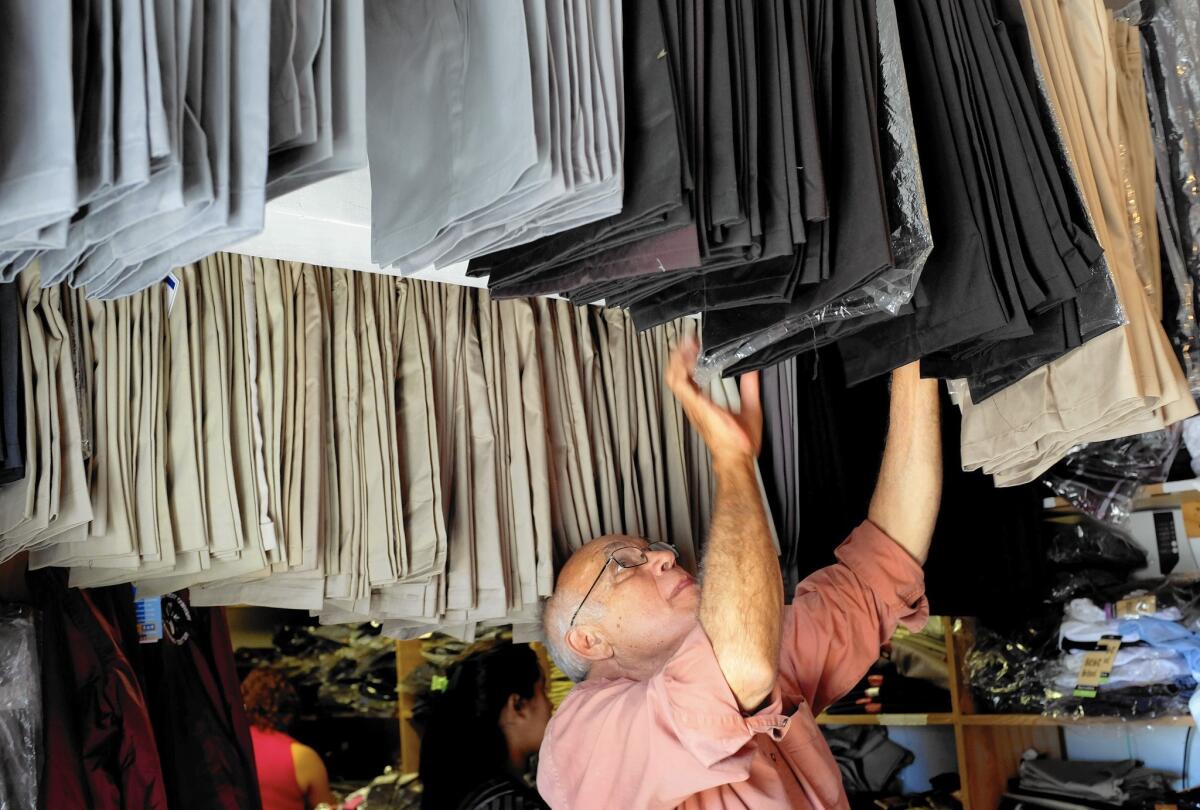Should L.A. legalize street vendors? Stakes are high for shop owners

For a quarter-century, Sigifredo Lopez has sold school uniforms out of his Pacoima shop, a warren of shelves bearing polo shirts, skirts and trousers in burgundy, navy and white.
But he laments that, for years, some of his toughest competitors have been able to undercut his business, plying their trade on the sidewalks.
Those rivals have no rent to pay and no business tax; instead, Lopez said, they just pull up in cars or vans outside schools in the summer.
“It’s illegal,” Lopez complained. “But they do it.” And he fears that Los Angeles lawmakers could soon make things worse.
City leaders are weighing whether to legalize and regulate the bustling trade that is already widespread on many sidewalks, an idea that has heartened throngs of street vendors who make their living selling ice cream, hot dogs wrapped in bacon and a slew of other goods.
Backers say legalizing sidewalk vending would boost tax revenue, better protect public health and bring new vitality to urban streets. Several lawmakers, including City Councilmen Jose Huizar, Gil Cedillo and Curren Price, support the idea, saying the city must halt the criminalization of vendors — many of them impoverished immigrants trying to get an economic foothold. Last year, police handed out nearly 900 illegal-vending citations, which can result in fines of up to $1,000 each.
“We will gladly comply with all the rules,” said Vicenta Martinez, a sidewalk vendor who came to a city hearing to plead for legalization. “We’re not criminals,” she added.
But business owners such as Lopez are pushing back, arguing that the city must make sure that any legal blessing for sidewalk vendors does not hurt law-abiding brick-and-mortar shops saddled with rent and other costs. Members of a group called the Coalition to Save Small Business argue that, as it stands, unlicensed vendors have an unfair edge over businesses like theirs.
“I have to pay liability insurance. I have to pay for health department permits. It’s a lot of overhead,” said Cesar Jimenez, who sells fish tacos at farmers’ markets that impose their own rules on vendors. “And they can just set up a cart on the corner?”
Other shopkeepers worry about mobile vendors who block or sully sidewalks, leaving neighboring businesses to clean up the mess, or set up shop right outside their doors. Many are doubtful the city would be able to enforce any rules at all: Sidewalk vending is now generally prohibited, yet remains widespread in areas such as MacArthur Park and the Fashion District.
“Some areas are wildly out of control,” said Councilman Paul Koretz, who has been skeptical of legalization.
As city officials mull over new rules, the business coalition says its membership has swelled to more than 1,000 small shops and restaurants. It is pushing officials to limit vending to areas where businesses and residents approve it, bar vendors from selling the same kinds of goods directly outside their brick-and-mortar competitors, and cap the number of vending permits.
In addition, the group wants fees imposed on sidewalk vendors to be high enough to cover robust enforcement of any new rules. “It defies logic to say that 17 inspectors and no additional LAPD officers can truly govern 500 square miles,” said Central City Assn. President and Chief Executive Carol Schatz, referring to one figure suggested at a city hearing for the possible number of added inspectors. Without enforcement, regulations would be “absolutely meaningless,” she said.
Champions of sidewalk vending counter that legalization and regulation is a good way to address the kinds of problems critics complain about — for instance, by requiring the health permits that Jimenez mentioned. Though activists have resisted the idea of capping the number of permits, draft rules suggested by the L.A. Street Vendor Campaign say that vendors should have to pay business taxes, get liability insurance and ensure that sidewalks have at least 5 feet clear for pedestrian traffic, among other requirements.
“Street vendors are saying, ‘We want to jump through all the hoops that a small business owner jumps through.’ They want to be regulated,” said Mike Dennis, director of community organizing for the East L.A. Community Corp.
Backers also point to a recent report by the Economic Roundtable, which contested the idea that L.A.’s small businesses were hurt by sidewalk vending. And Huizar said new regulations would provide a steady stream of permit fees to fund enforcement. “With a regulatory system, their concerns are going to be better dealt with,” the councilman said.
But so far, Los Angeles leaders have decided few details about how legalization might work, leaving a vacuum that has fueled a raw and rancorous debate over the mobile sellers who labor in the shadow economy. A string of city hearings this year often became heated, as sidewalk vendors booed opponents who argued that trash, crime or other ills trailed their trade.
It remains to be determined when, where and how sidewalk vendors could do business, how much they would pay in fees and how many city investigators would monitor vending. It is also undecided whether there would be blanket rules for the entire city or neighborhood-by-neighborhood regulations. Street vending advocates argue that the same rules should apply citywide because limiting vending to particular areas would effectively crimp the number of vendors who can obtain permission to operate, and force the rest back into illegal vending.
“We already know the pitfalls of this approach, because the city tried it and failed,” said Doug Smith, staff attorney for Public Counsel, a pro bono law firm that is part of the legalization campaign. That’s what went wrong years ago, he said, when the city tried to legalize vending only in MacArthur Park.
Schatz countered that the root of the problem in MacArthur Park was shoddy enforcement, not restricting the vending area. Illegal vendors continued to do business nearby.
Existing city rules already allow for the creation of “vending districts” if a minimum share of businesses and residents on each block agree, but none currently exist. Members of the business coalition say they would be willing to streamline those rules, but not toss them out entirely, so that neighborhoods can choose whether to allow vending.
Businesses along the Hollywood Walk of Fame, for instance, have complained that their sidewalks are already packed with costumed characters and performers. “To try to come up with a one-size-fits-all ordinance seems extremely ill-advised,” said Kerry Morrison, executive director of the Hollywood Property Owners Alliance.
To Jose Corona, who sells soccer jerseys at a Pacoima shop wedged behind the one run by Lopez, the question is whether city regulations can stop what he sees as unfair competition. Like Lopez, Corona complains about being undercut by street sellers who don’t have to pay rent. Sometimes, he said, they poach customers right outside his shop.
But if legalization means the city can impose the same requirements on those mobile vendors as it does on him, Corona said, he would welcome it. “If they pay taxes, if they’re supervised by the city, that’s less of a disadvantage for me,” he said on a recent afternoon, standing amid rows of boldly colored shirts and sneakers.
Next door, however, Lopez remains unconvinced that the city is capable of effectively regulating the sidewalk sellers. If it becomes legal, he said, he might just retire.
Los Angeles city lawmakers are expected to take up the issue later this fall.
Follow @LATimesEmily for breaking news from L.A. City Hall.
ALSO:
L.A. councilman calls for digital signs on city property
South L.A. taco stand shooting that injured 3 children stuns residents
Long Beach convent’s reopening helps boost the shrinking ranks of nuns
More to Read
Sign up for Essential California
The most important California stories and recommendations in your inbox every morning.
You may occasionally receive promotional content from the Los Angeles Times.











